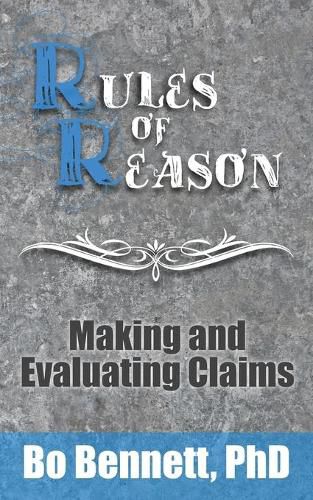Readings Newsletter
Become a Readings Member to make your shopping experience even easier.
Sign in or sign up for free!
You’re not far away from qualifying for FREE standard shipping within Australia
You’ve qualified for FREE standard shipping within Australia
The cart is loading…






This title is printed to order. This book may have been self-published. If so, we cannot guarantee the quality of the content. In the main most books will have gone through the editing process however some may not. We therefore suggest that you be aware of this before ordering this book. If in doubt check either the author or publisher’s details as we are unable to accept any returns unless they are faulty. Please contact us if you have any questions.
Claims are constantly being made, many of which are confusing, ambiguous, too general to be of value, exaggerated, unfalsifiable, and suggest a dichotomy when no such dichotomy exists. Good critical thinking requires a thorough understanding of the claim before attempting to determine its veracity. Good communication requires the ability to make clear, precise, explicit claims, or strong claims. The rules of reason in this book provide the framework for obtaining this understanding and ability.
This book is about the eleven rules of reason for making and evaluating claims. Each covered in detail in the book. These are:
1) Acknowledge the Limits of Your Knowledge Regarding the Claim.
2) Explore Your Biases Related to the Claim.
3) Isolate the Actual Claim.
4) Clearly and Precisely Define Each Relevant Term.
5) Use Terms That Reflect the Scope of the Claim Accurately.
6) Operationalize Terms When Possible.
7) Make the Claim Falsifiable When Possible.
8) Express an Accurate and Meaningful Level of Confidence.
9) Convert Causes to Contributing Factors When Appropriate.
10) Make Strong Analogies and Call Out Weak Ones.
11) Filter All Relevant Assumptions Through These Same Rules.
By the time you have finished this short book, no matter how good you were before at evaluating claims, you will be even better at it.
$9.00 standard shipping within Australia
FREE standard shipping within Australia for orders over $100.00
Express & International shipping calculated at checkout
This title is printed to order. This book may have been self-published. If so, we cannot guarantee the quality of the content. In the main most books will have gone through the editing process however some may not. We therefore suggest that you be aware of this before ordering this book. If in doubt check either the author or publisher’s details as we are unable to accept any returns unless they are faulty. Please contact us if you have any questions.
Claims are constantly being made, many of which are confusing, ambiguous, too general to be of value, exaggerated, unfalsifiable, and suggest a dichotomy when no such dichotomy exists. Good critical thinking requires a thorough understanding of the claim before attempting to determine its veracity. Good communication requires the ability to make clear, precise, explicit claims, or strong claims. The rules of reason in this book provide the framework for obtaining this understanding and ability.
This book is about the eleven rules of reason for making and evaluating claims. Each covered in detail in the book. These are:
1) Acknowledge the Limits of Your Knowledge Regarding the Claim.
2) Explore Your Biases Related to the Claim.
3) Isolate the Actual Claim.
4) Clearly and Precisely Define Each Relevant Term.
5) Use Terms That Reflect the Scope of the Claim Accurately.
6) Operationalize Terms When Possible.
7) Make the Claim Falsifiable When Possible.
8) Express an Accurate and Meaningful Level of Confidence.
9) Convert Causes to Contributing Factors When Appropriate.
10) Make Strong Analogies and Call Out Weak Ones.
11) Filter All Relevant Assumptions Through These Same Rules.
By the time you have finished this short book, no matter how good you were before at evaluating claims, you will be even better at it.